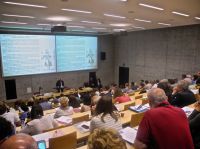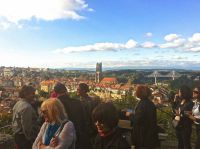2nd conference Fribourg 2014
2nd Conference of the International Research Association for History and Social Sciences Education – IRAHSSE
University of Fribourg, Switzerland
11th – 13th September 2014
WARS AND PEACE: EDUCATIONAL ISSUES
«Poison gas and Big Berthas might be the deadly fruits of verifiable science, but the impulse to sue them grew out of those stories we tell ourselves. So should we not try to understand their power better, to see how stories and historical accounts are put together and what there is about them that leads people either to live together or to maim and kill each other?»
Bruner, J. S. (1996). Teaching The Present, Past, and Possible. The Culture of Education. Cambridge US ‐ London : Harvard University Press, 90.
Wars and conflicts have always played an important role in the study of history, human geography and social sciences. From “battle history”, the fundamental objects of traditional history programs based on political history, has been to the identity purposes of programs which focus on the main events that have shaped the history of the nation, the history of wars functions by arousing student emotions. Indeed, these emotions are influenced by the revival of tragic aspects of past conflicts as well as by the connections between past conflicts and current issues.
Teaching practices related to the history of war have greatly evolved since the 19th century. At the beginning these practices were regularly associated with nationalism and militarism, which in turn is inevitably linked. Later, after the Second World War, the history of wars has generally lost its identity aspect and its ethnocentric stance gave way to a less engaged, more plural, discourse. This trend differs from State to State, but currently we are witnessing in relation to it to the rise of peace education with a strong historical basis together with the contributions of citizenship education or social psychology expertise.
A triple educational challenge
The aims of this conference is to examine ways of approaching such issues with regards to school politics, resources and common teaching practices. A specific focus is on empirical research and the impact of literacies targeting a new type of narrative. The issue is articulated around three axes: politics, historiography and media. They are defined in order to examine, according to the key perspectives, curricular and extracurricular production resources as well as the formats, techniques and methods of teaching social sciences based on the conference theme : discourse on wars and conflicts. The focus is on how they enter the school praxis. The axes are not restrictive; there may be some overlap in the content of the communications.
Axis 1: Politics. How can a traumatic past such as wars, in any form, be either forgotten, possibly reduced to a date in a textbook, or mobilized in a memorial process (for example, the claim for a “duty of memory” stemming from a political, social or cultural group, or from any official commemorative procedure), or, on the contrary, processed according to a historian heuristics for the school? What is the historical logic behind certain case studies and what can be the impact of certain ways of thinking, spontaneous or historical, on teaching methods and student representations? What position should history or social science teachers take in teaching these themes that are favorable to developing citizenship attitude, scientific orientation and possibly to new militancies?
Axis 2: Historiography. What influence does historical research have on the historical aspects of education, considering the conclusions brought forth by historians’ research on wars and conflicts? To what aspects are schools attentive: biographical, political, military, economical, cultural, technical…? Does a national point of view prevail now or ever, here or there? On the contrary, does it offer students a plural approach and, if so, in what conditions, for what results? What are the limits of these approaches, for example, in multicultural classes? Can the use of a disciplinary or scientific historiography improve a better management of these situations?
Axis 3: Media. At present the media plays a crucial, even determinant role in the elaboration of social representations as well as in the shaping of views on the aspects of war, conflicts and peace processes. Are there significant teachings practices related to the ever increasing ways of broadcasting information? How are multimodal media texts explored? Do students and teachers realize that reading these texts encompasses not merely the learning of information but also the understanding of their formats, uses, and roles in knowledge construction? How do teachers develop critical minds using deconstruction‐reconstruction didactics that are confronted to the influence of media with regards to this conference’s theme?
Pierre-Philippe Bugnard, President of the Conference (University of Fribourg, Switzerland)
IRAHSSE Board (2013-2015)
Félix Bouvier (Université du Québec à Trois-Rivières), Pierre-Philippe Bugnard (Université de Fribourg), Luigi Cajani (Sapienza Università di Roma), Théodora Cavvoura (University of Athens), Nadine Fink (Haute Ecole Pédagogique Vaud), Mostafa Hassni-Idrissi (Université de Rabat), Maria do Céu de Melo (Universidade do Minho).
Steering Committee
Pierre-Philippe Bugnard, président (Université de Fribourg), Luigi Cajani (Sapienza Università di Roma), Bernadette Charlier (Université de Fribourg), Pierre-François Coen (Haute Ecole Pédagogique de Fribourg), Nadine Fink (Haute Ecole Pédagogique Vaud), Maud Foerster (Université de Fribourg), Prisca Lehmann (Gymnase d’Yverdon), Anne Philipona (EPAC Bulle), Johan Wassermann (University of KwaZulu-Natal).
Scientific Committee
François Audigier (Université de Genève), Félix Bouvier (Université du Québec à Trois-Rivières), Pierre-Philippe Bugnard (Université de Fribourg), Luigi Cajani (Sapienza Università di Roma), Théodora Cavvoura (Université d’Athènes), Bernadette Charlier (Université de Fribourg), Pierre-François Coen (Haute Ecole Pédagogique de Fribourg), Nadine Fink (Haute Ecole Pédagogique Vaud), Markus Furrer (Pädagogische Hochschule Zentralschweiz Luzern et Université de Fribourg), Peter Gautschi (Pädagogische Hochschule Zentralschweiz Luzern), Neus González (Universitat Autònoma de Barcelona), Mostafa Hassani Idrissi (Université Mohammed V), Philippe Hertig (Haute Ecole Pédagogique Vaud), Estevão de Rezende Martins (Universidade de Brasilia), Maria do Céu de Melo (Universidade do Minho), Béatrice Rogéré Pignolet (Université de Fribourg et Haute Ecole Pédagogique du Valais), Joaquim Prats (Universidad de Barcelona), Anne Sgard (Université de Genève), Nicole Tutiaux-Guillon (Université de Lille), Pierre Varcher (Université de Genève), Johan Wassermann (University of KwaZulu-Natal), Beatrice Ziegler (Pädagogische Hochschule Nordwestschweiz).
The Journals
Studi sulla Formazione
and
Didactica Historica
published several articles related to presentations at the second IRAHSSE international Conference in Fribourg in September 2014.



